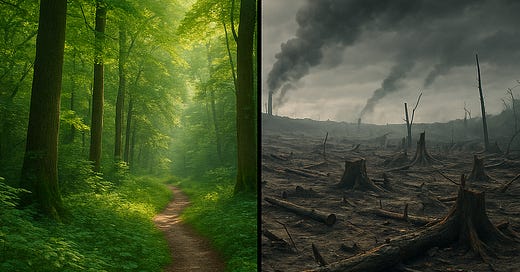The world is groaning. Our shared home is in crisis mode. From record-breaking heatwaves and disappearing forests to polluted oceans and vanishing species, the signs are clear: the earth is under duress. For some, these are simply environmental issues. For others—especially Christians—these are deeply spiritual ones. But whether you believe in God or not, we all share this fragile planet. The environmental crisis is a human issue before it’s anything else.
I believe it is imperative that we see the world not just as a resource, but as a gift. And for Christians it is critical that we see caring for the earth as part of the story of redemption—from Eden to New Creation.
Eden: The Original Design
In the opening pages of the Bible, the world is not a battlefield or a wasteland—it is a garden. Eden. A place of beauty, balance, and bounty. The first humans are not consumers or conquerors; they are caretakers. The Hebrew text uses the words “avad” (to serve) and “shamar” (to keep) to describe their role. They are to tend the garden, not exploit it.
Regardless of what you believe about the origin of life, this image of humanity as stewards rather than dominators speaks to a profound truth: we thrive when we live in harmony with nature, not in opposition to it.
Fast forward to today. Plastic chokes our oceans. Air pollution cuts lives short. Climate change threatens food systems, weather stability, and global peace. The world is out of balance.
For Christians, this isn’t just an ecological issue—it’s a theological one. The Bible speaks of creation as something good, something that praises God simply by being what it was made to be (see Psalm 19 and Romans 8).
Neither is it just a religious concern. Scientists and environmentalists, too, speak with urgency about our need to care for the planet. Whether your motivation is divine calling or shared humanity, the conclusion is the same: something must change.
The Gospels make it clear that Jesus loved nature. He doesn’t preach only in synagogues. He teaches by the sea, on mountains, under fig trees. His parables are filled with seeds, soil, vines, birds, and storms. He calms winds and walks on water—not to dominate nature but to restore peace.
His resurrection takes place in a garden. And in one of the most beautiful ironies of the Gospel story, Mary mistakes the risen Jesus for a gardener. Perhaps she wasn’t wrong.
One of the most powerful themes shared both by the Bible and the environmental movement is restoration from exploitation . Christians speak of God making all things new. Environmentalists talk about rewilding, healing ecosystems, reversing damage. In both visions of restoration, hope isn’t found in denial or despair, but in responsibility and renewal.
Whether you see creation care, like I do, as obedience to God or as a moral duty to future generations, it leads to the same practices: reducing waste, conserving energy, protecting biodiversity, advocating for policy change.
The biblical narrative ends not with the destruction of earth, but with its renewal. A New Heaven and a New Earth. The holy city descends not to escape the earth, but to dwell on it. God doesn’t abandon creation—He moves in.
For believers, this is a picture of where we’re headed. It is also a vision of a world where people and nature thrive together.
Caring for the environment matters because it is not about politics. It’s about love—love for the world that sustains us, love for our neighbors who suffer most from environmental harm, and love for generations yet to come.
So whether you’re drawn to the story of Eden or simply stirred by the beauty of a forest trail, the invitation is the same: Live gently. Act wisely. Hope fiercely.
From Eden to New Creation, let’s move from passive observers to active caretakers, gardeners, healers. Let’s help the earth flourish again.
Surely, both those of us who believe in the Lord and those who do not, can agree on this: the earth is worth saving.




